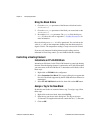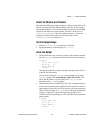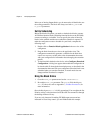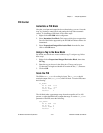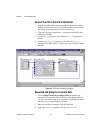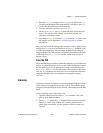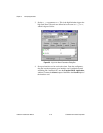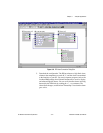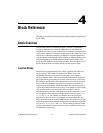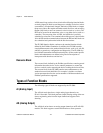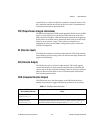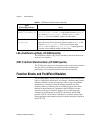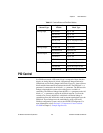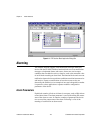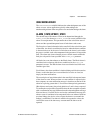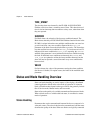
©
National Instruments Corporation 4-1 FieldPoint FP-3000 User Manual
4
Block Reference
This chapter describes the function blocks and the parameters supported by
the FP-3000.
Block Overview
The FP-3000 consists of a number of blocks. A block is a predefined
software module that runs on an FP-3000 and acts as a fundamental
component of a control system. Each block has a number of parameters that
can be used to adjust the configuration of that part of the system. These are
referred to as contained parameters. In addition to contained parameters,
some blocks have I/O parameters. I/O parameters of different blocks can be
connected together to establish communications between blocks. Each
block on an FP-3000 has an associated algorithm. There are three types of
blocks: function blocks, transducer blocks, and the resource block.
Function Blocks
Function blocks implement the basic control algorithms that make up a
control strategy. The Fieldbus Foundation has defined a set of ten
fundamental (or elementary) function blocks and a set of nineteen
advanced function blocks. The function blocks encapsulate a significant
part of the control system behavior, thereby relieving a host of such tasks.
The Fieldbus specification defines the parameters of each function block,
how to make each parameter accessible to host system, parameters for
configuring function blocks, and I/O parameters that can communicate to
or from other function blocks in the system. For example, an Analog Input
(AI) function block has parameters to scale a transducer value to
engineering units. It also has alarm limits that can be configured by a host
or a configurator. The AI detects and reports process alarms such as
HI_HI,
HI, LO, and LO_LO. The Fieldbus specification does not specify the
algorithm for function blocks. For example, the specification does not
define the actual equations to use in a PID function block. However, it does
define all the parameters needed for configuration and operation of the PID,
such as
RATE, GAIN, RESET, and MODE. The execution of function blocks
and the communication between function blocks on different devices are
scheduled deterministically.



